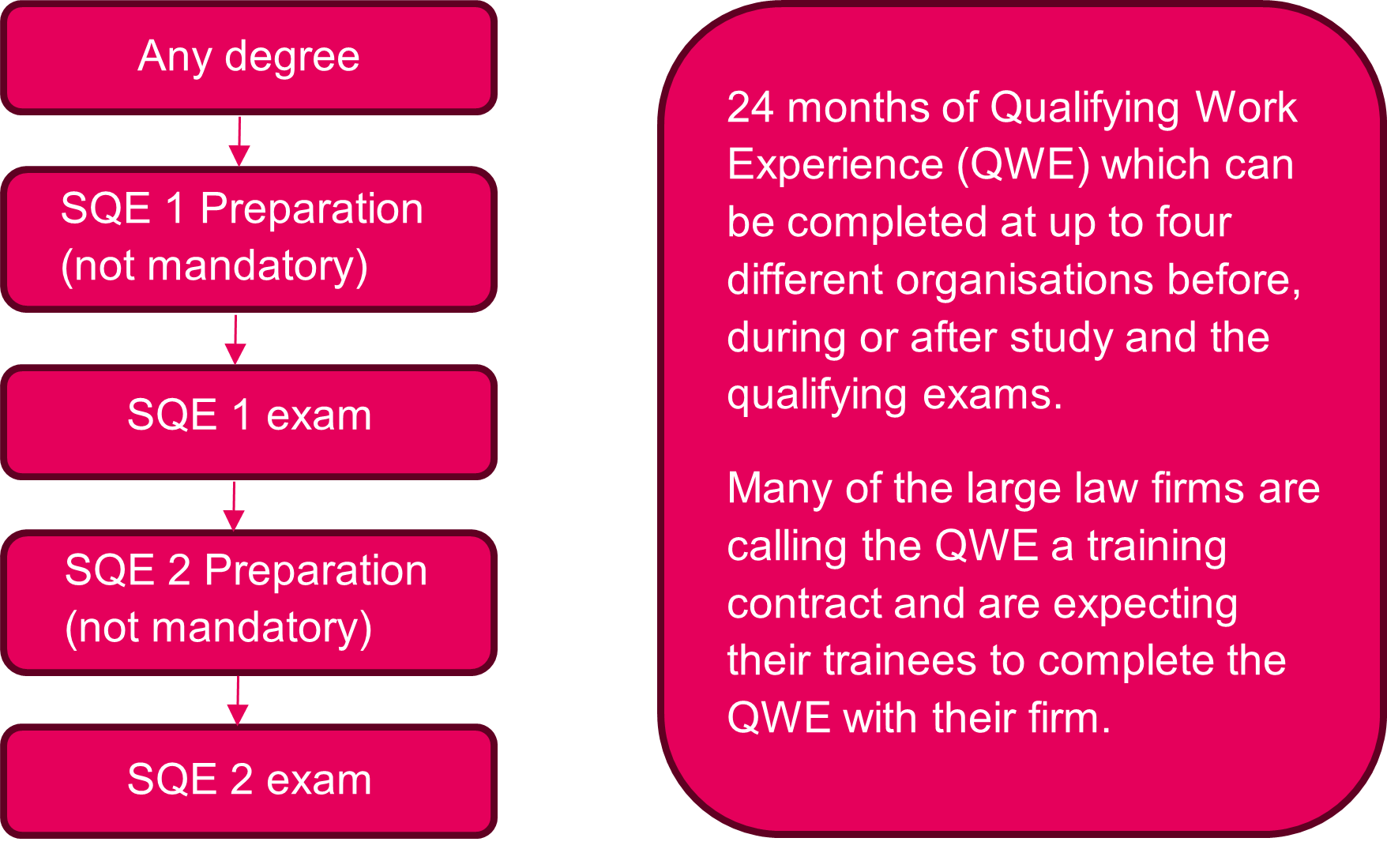Routes to becoming a solicitor
We encourage you to take part in a series of suggested activities so you can be sure that training to become a solicitor is the right path for you, and to give yourself the best chance of success.
Visualised: becoming a solicitor

Steps mandated by the Solicitors Regulation Authority (SRA)
- Any UK degree or equivalent level 6 qualification (qualifications obtained overseas can be checked here). However, most firms require their future lawyers to have a law degree or equivalent.
- Pass Solicitor Qualifying Exams part 1 & 2.(add link to NLS prep course details). The SRA do not require applicants to have completed preparation courses, but it would be very difficult to pass the assessments without having studied these. Have a look at Nottingham Law School's SQE Preparation Courses.
- Complete two years of Qualifying Work Experience (QWE); QWE can be completed before, during or after passing SQE assessments and can be completed at up to four different organisations, see here for details. Many of the larger firms prefer their future lawyers to train with them and are calling their version of QWE a training contract. The term training contract has been previously used to cover the period of recognised training.
- Pass the SRA Character and Suitability assessment.
For further details see SRA guidance here.
Routes through law firms
Some firms are calling their offer a Graduate Solicitor Apprenticeship. This can be started on completion of an undergraduate degree. Most, but not all firms require applicants to have successfully completed a law degree or a law conversion course prior to start date. The Graduate Solicitor Apprenticeship term means that the firm organises and pays for the SQE training, assessments and the QWE. Applicants can apply for Graduate Solicitor Apprenticeships from the second year of their undergraduate degree onwards.
Other firms are calling their offer a Training Contract and some will still organise and pay for the SQE training, assessments and the QWE. These tend to be the large firms specialising in commercial practice areas. It is possible that some applicants may have completed their QWE at a different organisation, but many firms are likely to want future trainees to do their training with them. Applicants can apply for most training contracts with larger firms from the second year of their undergraduate degree onwards.
Some smaller firms still offer training contracts, but are not likely to pay for the SQE training or assessments. Application deadlines for smaller firm vacancies vary and can be from over a year in advance of start date, but many are within months of start date. Applicants can do their QWE at these firms or may have already done some or all of their QWE at other organisations. Many smaller firms take future trainees on as paralegals in the first instance and it is worth being aware that many future lawyers will start out as paralegals regardless of the type of firm they hope to practice with.
What activities should you do?
We encourage you to start taking part in these activities from your first year. This helps you to fit a variety of experiences into your schedule, develop your skills and your understanding of what you enjoy doing the most.
Attend the NLS November Law Fair and chat to the various representatives from law firms and other organisations. Last year’s fair had representatives from over 50 organisations.
Attend some law firm insight days to get opportunities to speak to trainees. These are offered by the larger commercial law firms and it can be helpful to attend before applying for vacation schemes (work experience) with law firms. Some are online and some are in-person.
Apply for a vacation scheme, timings vary, but usually from second years onwards. Many large firms expect their future trainees to have done one of their vacation schemes and recruit their trainees from these.
Prefer the idea of a smaller firm? Contact some near you to see if you could do a short period of work experience with them. See NLS NOW Employability learning room for CV and cover letter guidance to help with this.
Activities with NLS Legal and Support Through Court
Practice using your legal skills by volunteering with the award-winning NLS Legal. Their opportunities are advertised on the NLS Legal NOW learning room.
NLS is additionally the sole host university for Support Through Court's (STC) National Helpline and National Online Service. Both national services enable those without legal representation to receive immediate help, support and guidance. A benefit of our expanded STC partnership, NLS students can access an increased number of work experience opportunities - making it the largest STC university partnership to date. Opportunities are advertised on the STC NOW learning room.